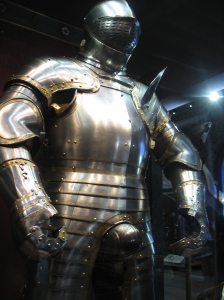
Thomas Becket or Thomas A Becket? Which is right? Either? Neither?
A recent discovery in the archives of the Vatican has solved this for once and for all. The Latin translation of this valuable document has been painstakingly done by myself with the aid of a 1903 Preparatory School Latin Grammar Crammer and a Swahili to Latin dictionary with book worm.
Thomas A Becket was born in 1118, his cousin Thomas Becket in 1119. The two boys were brought up together and there was a great similarity in their appearance. The A of Thomas A Becket, stood for Alphonse, which he hated and rarely used.
Upon reaching adulthood at the age of about 14 the boys went their separate ways, Thomas A into marriage and fatherhood and Thomas into the priesthood. They had always enjoyed wearing things on their heads and the respective hoods seemed ideal! If Robin Hood had been invented then, one of them would have been sure to follow him!
Despite the reversal of fortunes of the father and uncle of the boys, Thomas rose rapidly through the ranks of the clergy whilst Thomas A held a good position as a clerk for King Henry II, both men putting their king before everything else.
Thomas Becket was nominated as Archbishop of Canterbury in 1162. Henry probably hoped that he would continue to put the royal government first, rather than the church but no, that was not to be. Thomas transformed himself into an aesthete and became, (in modern parlance), a bit of a Jesus Freak, growing his balding hair long, wearing sandals and only eating bran, thereby renouncing all worldly pleasures in his quest for greater spirituality.
King Henry was a religious man himself and frequently attended confession, going, instead of to the normal confessional, to a large, blue painted metal box with windows and a sort of devotional lamp on the top. He would come out of the box with a look of bewilderment, invariably saying ‘it is larger on the inside than it looks on the outside’. No one ever saw his confessor going into or leaving the confessional. Indeed, sometimes people seemed unable to see the confessional, as if it moved beyond their range of sight.
Henry became increasingly fed up with Thomas’s new found spirituality and unwashed feet and wanted a return to the old style arch bishop. He consulted for a long time with his confessor before approaching his government about getting rid of Becket. Holding up his hand for silence he began, ‘Who will…’ The rest of his speech was drowned out by a babble of voices all saying that they would. The king tried again. ‘Who will rid me of this…’ and again he was shouted down by an excited clamor of voices. If kings had been known to utter profanities, at this point he would have yelled, ‘FFS!!! Shut up and listen’, but decorous to the last his voice fizzled out with, ‘rid me of this turbulent priest.’
There was a mad scramble for the door as men rushed to do what they thought the king had bidden them to do, namely murder Thomas Becket.
Thomas Alphonse Becket heard of this as he was getting ready for bed and unshaven, night gown on, sandals untied, hair awry and feet unwashed he rushed to Canterbury Cathedral to warn his cousin, getting there just as the door to the blue confessional swung open and a man wearing a very long multi coloured scarf reached out, grabbed Thomas and pulled him into the confessional.
To Thomas Alphonse’s amazement, the confessional seemed to burp once or twice and dematerialize, never to be seen in that area again.
He was just trying to come to terms with that when armed men burst in and chopped the top off his head having mistaken him for his cousin, the missing Arch Bish.
Of course Thomas A died in agony in a pool of blood in his cousin’s cathedral, was buried as a martyr and sainted without anyone ever realizing that the wrong bloke had been killed.
As for Thomas Becket, he travelled in the dark blue confessional, with his learned priest confessor who turned out to be a very clever Doctor …
Or should I say … with his learned priest/confessor Who, who turned out to be some very clever Doctor chappie from the future.
The doctor sensibly steered the Time Machine/confessional in the direction of 1970s England and landed at Glastonbury during a festival, to the surprise of no one.
Thomas Becket embraced the drug culture of the age with fervour before having (another) epiphany, changing his name to Ian Duncan Smith and becoming a Conservative MP.
So, when someone asks ‘Thomas Becket or Thomas A Becket? Which is right? Either? Neither?’ the answer is BOTH!
Further reading:
Canon Ixus 115 HS instruction manual
An afternoon breeze
expels cold air, along with
the fallen brown leaves.
The Lion, The Witch and the Wardrobe: CS Lewis (in Swahili)
A bird flies sweetly
on paper wings. Telling all
of my love for you.
1903 Preparatory School Latin Grammar Crammer pp 7-14
The back of the credit card bill
Eeny meany mackeracker
Airy o and dominacker
Chicker chocker lollypopper
La pom poo
Jeff Jefferty Jeff 1/2/16 ©




